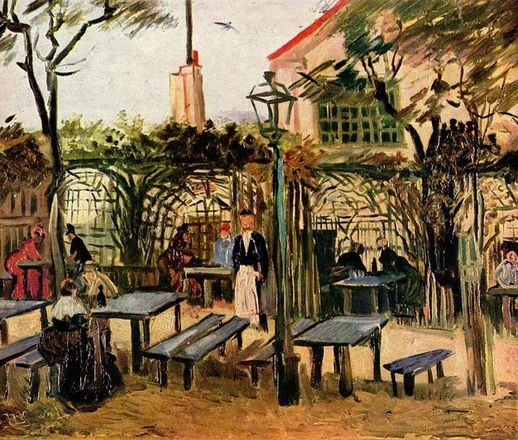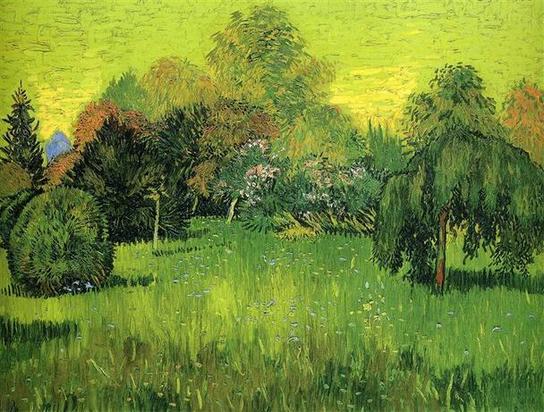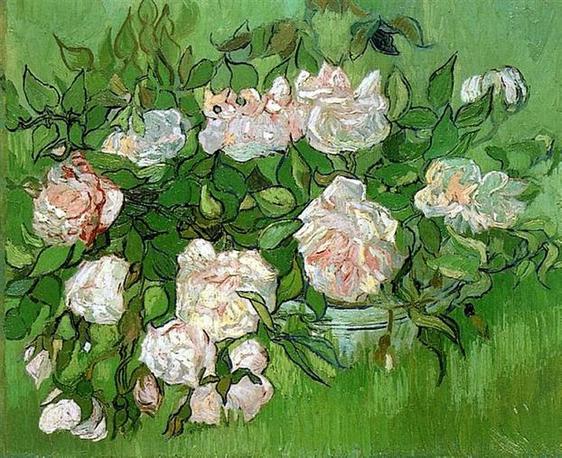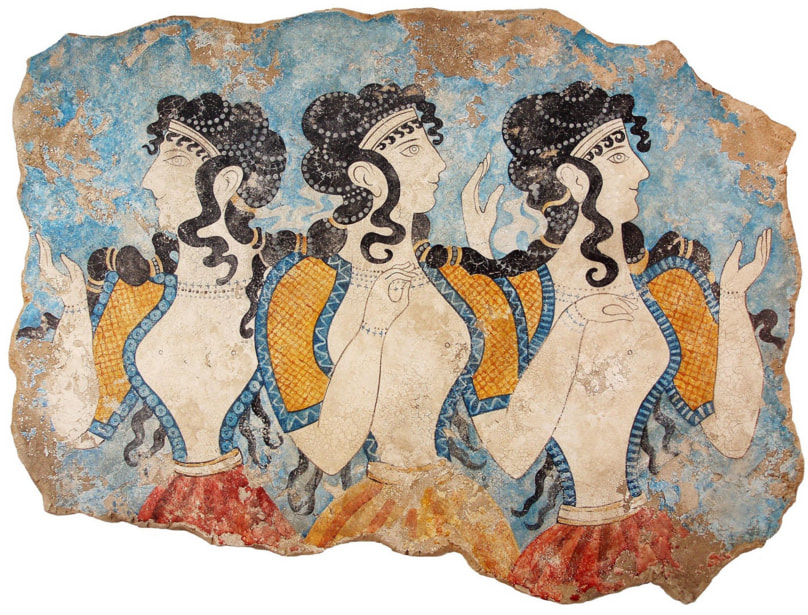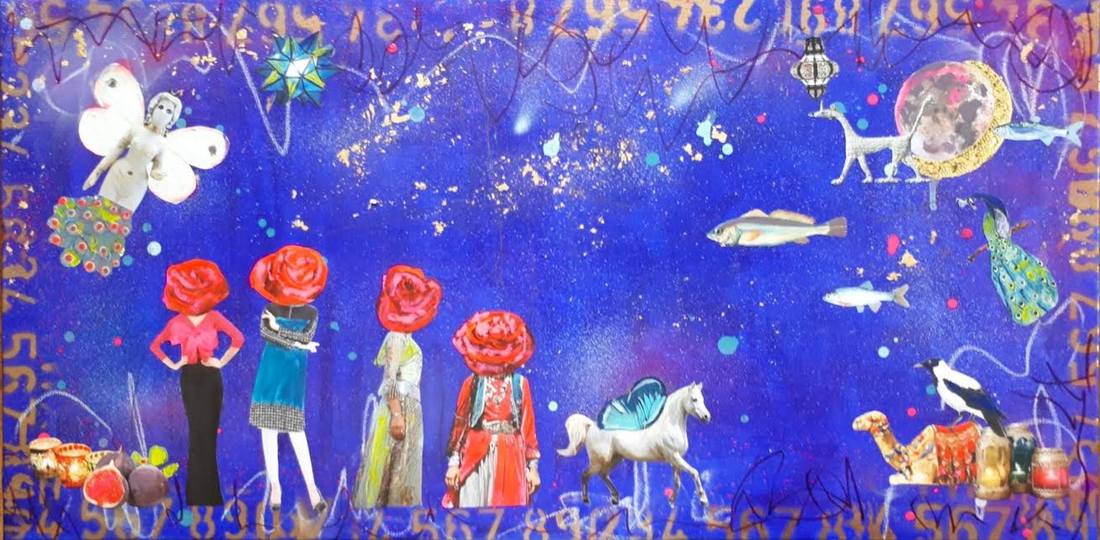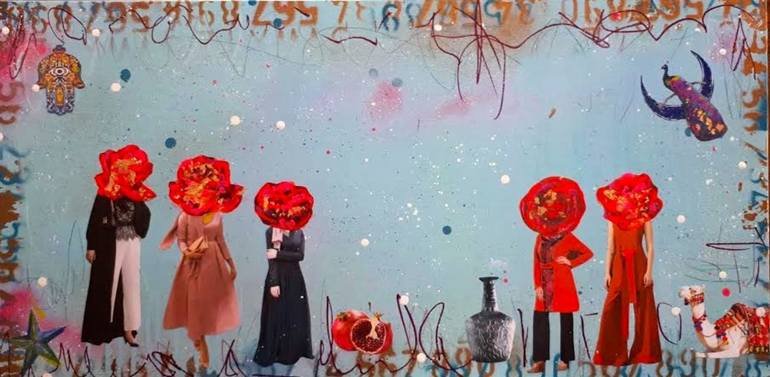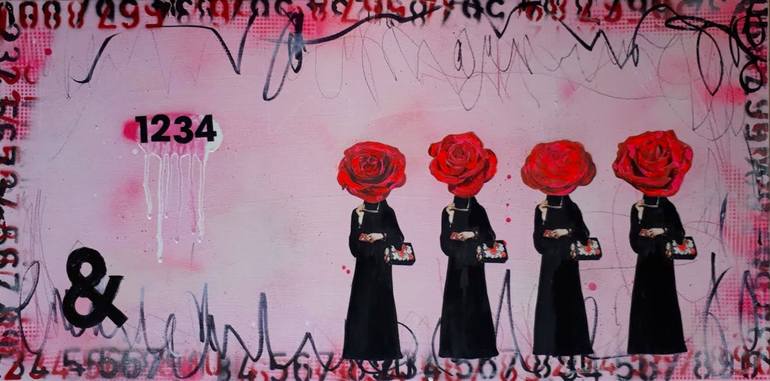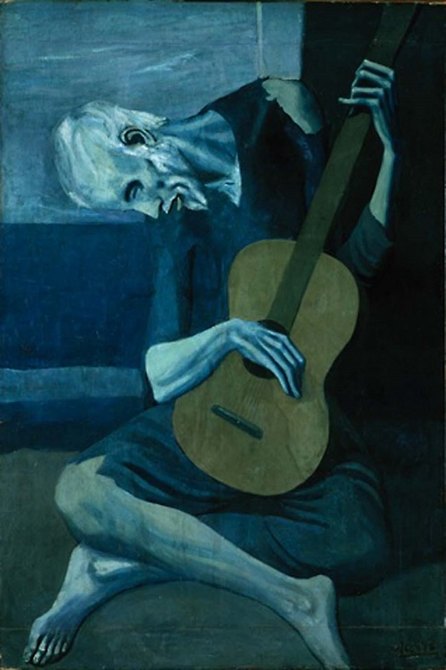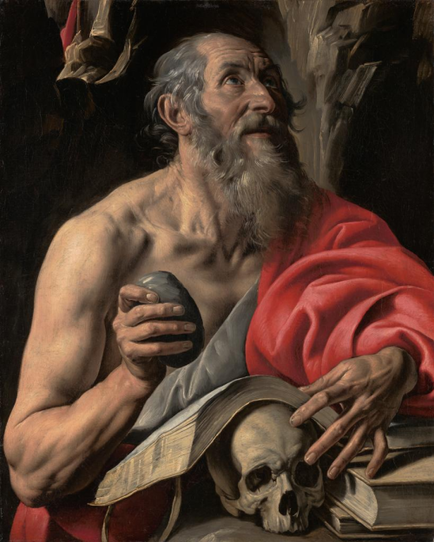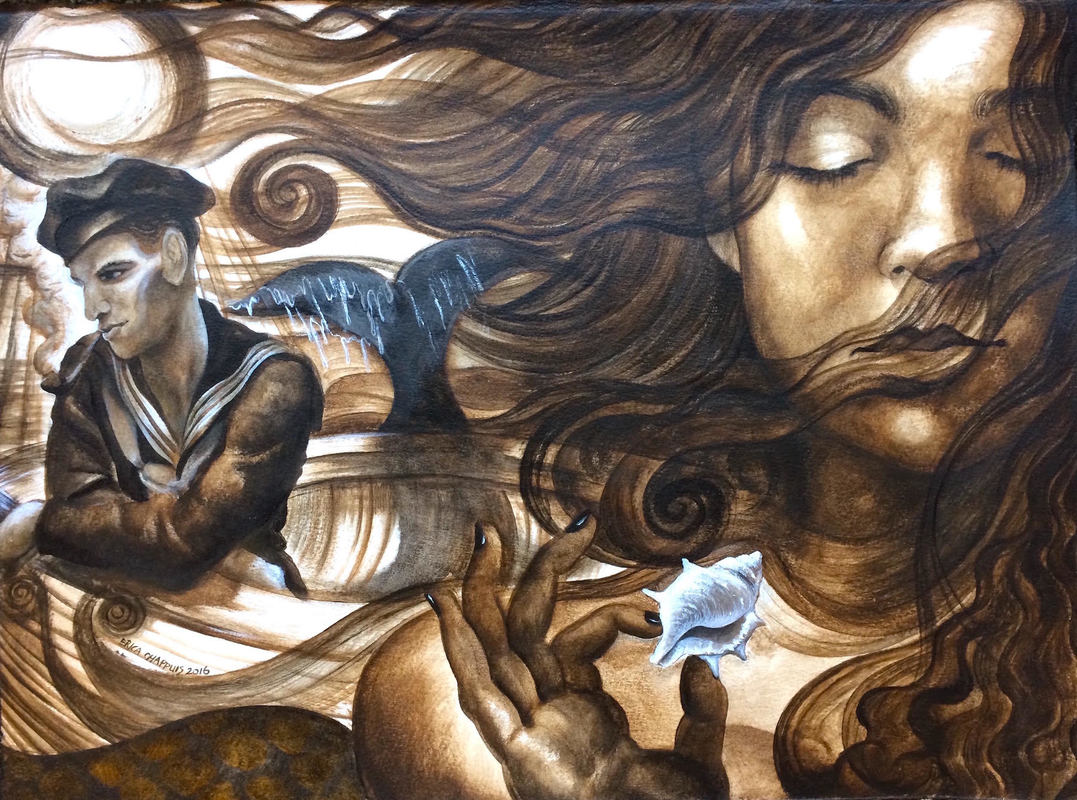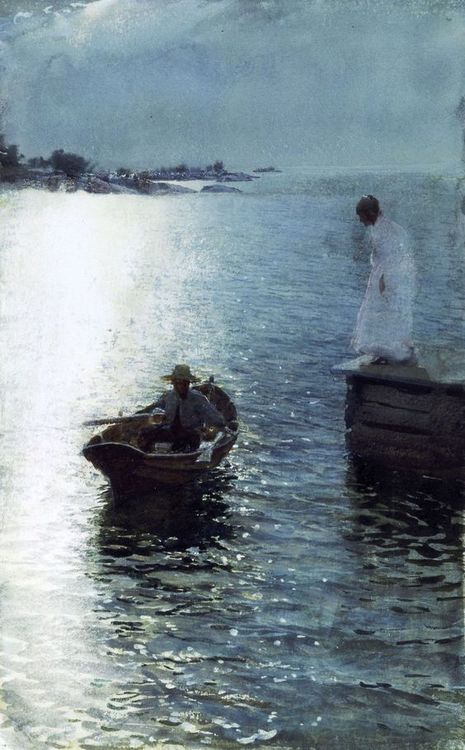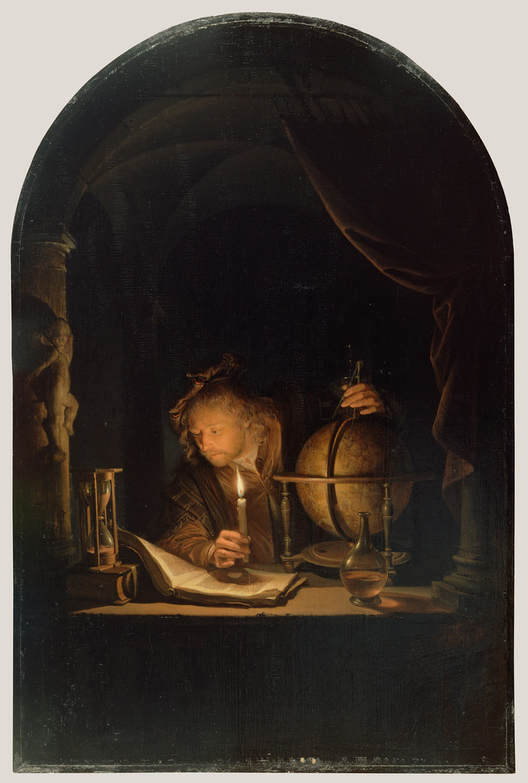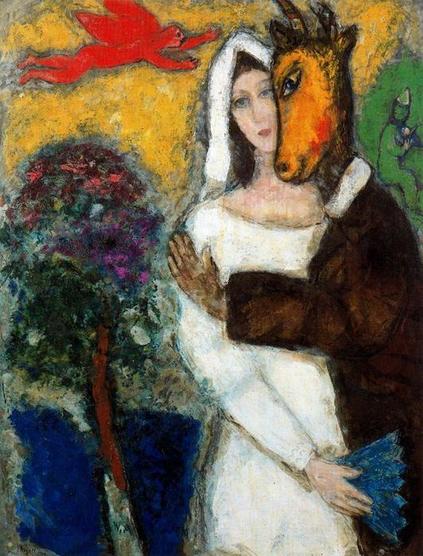|
La Guinguette A river café. This one in Montmartre, but just as likely Amsterdam, where a walk along canals is a dangerous temptation, an impulse to slip into water undredged since Spring, hook a toe on a tipped bicycle or a hand on a floating doll while patrons watching from their canal-side benches, clink their Amstels and laugh at the foolish seduction of drowning. Mary C. Rowin My Dear Theo* a picture of a garden in sunshine, over the vault of heaven a marvelous blue, heavenly blues and yellows then sunflowers the red sun the last a garden, painted without green ordinary plane trees; pines in stiff clumps, a weeping tree I am ravished, ravished with what I see Petrarch lived near I am seeing the same cypresses and oleanders pictures painted in citron yellow and lime green poetry is more terrible than painting the painter holds his tongue someday you too will know a day without wind what pure air, what vibrant serenity the sunflowers and the gardens suggestive colour without talking about it there is the fatal necessity which will ruin us what days these are, are not finished. Mary C. Rowin *An erasure poem from a “Letter from Vincent van Gogh to Theo van Gogh, Arles, c. 17 September 1888.” "Great Bouquets of Roses"
1890. Vincent felt it when he painted pink roses at the end of his stay in Saint-Remy. Recharged and optimistic, floral paintings in violet and pink filled his days at the asylum where he wrote, “The last days in Saint-Remy I worked like a madman.” 1979. Adding a pint of red to a gallon of white, guards coated prison walls & ceilings with pink blush, watched violence fade as the colour called “drunk tank pink” washed over inmates. The colour’s charm spread. Scientists rushed in, revealed lower blood pressure in emotionally disturbed patients when exposed to the colour pink, less time needed to calm them. Mary C. Rowin Mary C. Rowin’s poetry, essays and reviews have appeared in a variety of publications such as Persimmon Tree, Hamline Lit Link, Hummingbird, Solitary Plover and Oakwood Literary Magazine. Recent awards include poetry prizes from The Nebraska Writers Guild and Journal from the Heartland, and Honorable Mentions from the Wisconsin Fellowship of Poets and Wisconsin People and Ideas. Mary lives with her husband in Middleton, Wisconsin. Editor's note: Mary C. Rowin wrote these for the Ekphrastic Van Gogh challenge and submitted them clearly marked. It was entirely the mistake of The Ekphrastic Review that the email went into the general submission file and was not viewed in time to consider them along with the other challenge entries. We thought it best to publish them after the fact rather than adding them after the fact to the older posts, so that they wouldn't be missed by our readers.
0 Comments
Trust
there are many of us. we are born and then divide and divide until we are one with the sparrows and the crows. we are promised that we will become like the sparrows and the crows. we shall not be sacrificed. many of us will be made and there will be no talk of sacrifice. we have been promised by the speakers of the gods we will live and live until the gods welcome us to their homes. we will replace the sparrows and the crows and the gods will watch us scatter around their mountains and valleys and we shall never leave. all we think of is joining the gods. we think of nothing else and smile as the division continues. we think of the gods and we divide and wait. we wait. John Riley John Riley lives in North Carolina, where he works in educational publishing. His fiction and poetry have appeared in several print and electronic journals, including SmokeLong Quarterly, Connotation Press, Willows Wept Review, Loch Raven Review, Dead Mule, and Blue Five Notebook. He can be reached at riley27406@gmail.com. Three collage paintings by Lorette C. Luzajic on sale for $400 with free shipping.
These works were inspired by women poets of Iraq and the imaginative lore and symbolism of Mesopotamia from Sumer to the present. They are being offered to Ekphrastic readers with a 33% discount and free shipping. Your support of The Ekphrastic Review is much appreciated. The Guitarist’s Lament
fingers thin as chopsticks hollow cheeks sallow skin time etched in flesh he plays the song about the day she ducked into his shop pink taffeta pillbox hat skirts hung like fractured wings & clung to her stockings streamlets dripped into patent leather the heel of her pump like a wounded wren so delicate so damaged she peered out the window searched the face of each passerby as if fearing whom she’d find his sternum echoed her heart frantic & trembling hand brushed instep foot slid into mended shoe she fled & vanished into the tight fist of the crowd he sits by the window cross-legged & barefoot slumped upon the hardwood floor skin like vellum holds in the ache he strums a slow blue tune calls to her ghost with the rising indigo Kari Ann Ebert Kari Ann Ebert’s poetry has appeared in literary journals including cahoodaloodaling, The Broadkill Review and Gargoyle, as well as the anthology Aurora. She also writes short fiction and is currently editing her first novel. She was selected by Delaware Division of the Arts to attend the 2016 Seashore Writers Retreat and was nominated for a Pushcart Prize in 2016. She lives in Delaware where she enjoys being a part of a vibrant tribe of writers. She has two grown children who write and are active in the dramatic arts. Saint Jerome
Who were you, Saint Jerome? Were you as Bloemaert depicted you: A Santa Claus-like figure Cozy in your well-lit study, Pince-nez perched on your nose, Your wrinkled but strong, clean, healthy hands Holding your translation of the Bible? Or were you as depicted by the Italian: A gaunt, half-naked hermit In a filthy cave, The dirty nails of one atrophied, arthritic hand Lightly resting upon a skull O’er which your book is laid, Your eyes, without spectacles to aid them, Gazing specter-like toward heaven, Your clean red robe a contrast To your Cardinal’s cap crumpled in a crevice, Your other hand clutching a rock With which to beat your bony breast, A bruise spreading across your sternum? You knew only too well, scholar and saint, What may be lost in a translation And what biases the translator might introduce. Did you seek divine inspiration for your great task or divine forgiveness for daring to translate The Word of God? Steven Wittenberg Gordon Dr. Steven Wittenberg Gordon is the editor-in-Chief of Songs of Eretz Poetry Review (www.SongsOfEretz.com) and divides his time between editing, writing, and a private addiction medicine practice in Kansas. Echolocation
The match flared up, illuminating the man’s features, then arced brightly into the waves. The man drew on his pipe, the only thing he had saved before boarding the empty lifeboat. He counted it a miracle that the matches and the tobacco had stayed dry. The remnants of his ship – and his shipmates – floated on the burning sea. He felt nothing. He wasn’t terribly surprised that he felt nothing, not even as parts of those he would have called “friend” just hours before floated by, still recognizable, still with names. They wouldn’t have names for long. The Moon rose over the devastation left by the torpedo. He sighed, and settled in. The waves made a steady, soft slap on the small boat. It was soothing, in spite of the debris, the burning and the bodies. He noted the glint of the moonlight on the sea. Its beauty. The scudding clouds. The halo around the full Moon. The horizon was so brightly lit by Moon and by oil fire that it almost resembled day. That was what had made the night so dangerous. That damned Moon. But he still couldn’t feel any horror, or sadness. He felt only the uselessness of it all. The war hadn’t been his idea, after all. He was every bit as content being alone here under the moonlight, in a small boat with no one else around. And it was no more dangerous than when he had been on a big warship. He liked it better, in fact. He never had liked the intrusion of the other men, at close quarters, onto his thoughts. He got along with them okay. He had tried to save them. But it had all happened so quickly and the next thing he knew he had found himself alone in a lifeboat, stepping almost lightly into it once he knew he was completely alone. But he didn’t need the other men. He only needed the sea. That and his tobacco. And his own thoughts. A small splash caught his attention. It was out of sequence with the steady slap of the waves against the hull of the lifeboat. A fish, he thought, and turned to glance over his shoulder. But there was nothing there. He turned back to gaze out across the water. Maybe a signal had gone out. Maybe a convoy would arrive and pick him up. He almost didn’t care. I must have been hit in the head, he thought. I can hear someone singing. He noticed a patch of long seaweed floating near the lifeboat. It was almost like hair, darkly snaking and undulating in the sea, with every motion of the waves. As he watched it moved under the boat, then quickly disappeared. He thought he saw a fish tail as well, following the seaweed. Must be some sort of fish that feeds on kelp, he said to himself. A thump on the side of the boat and this time he startled. He spun around in the boat, nearly dropping his pipe. A woman was gazing at him from the side of the boat. Her small hands clutched the gunwales and her hair was long and wet and stuck to her shoulders. The rest of her was in the water. What was a woman doing all the way out here? Where had she come from? Was there a boat nearby? He looked around, but saw nothing except the burning oil and the detritus and the bodies. The woman opened her mouth and sang. The song was strange, lovely and soft, but as if a dolphin had learned to sing, not a human woman. Her voice went deep inside of him, touched the areas around his heart, tenderly, feeling its contours, as if taking its measure. She sang for some time, then held out a small, perfect shell. He took the shell and held it to his ear. It was just an ordinary shell, but for a second he felt as he had when, as a child, he had listened to what the grown-ups said was the faraway sea. In place of the sea, though, he thought he could hear the echoes of home, the voices of his parents and siblings. He longed for the warmth and light of home, was sick with longing. And he wept, thinking of all the wonders he had lost sight and sense of since. When he looked up again she was still looking at him. Silently she slipped back into the waters. He threw himself at the side of the boat and reached into the water. She was still looking up at him from below the boat. He could see her full tail and naked body. He longed for her, needed her, wanted to cling to her beauty and the miracle of her, needed to hear her song again. But she sank further and further out of view, into the cold, dark sea. Desperately he picked up the oars and began to pull at them. Where was she? He pulled and pulled, searching all over the surface of the sea. But she was gone. The sea was a calm mirror now, reflecting only his own image back to him as the horizon began to warm and brighten. He held the shell to his ear and heard the song again. And he pulled at the oars toward the rosy horizon and the form of a ship appeared on that line between the dark sea and the dawn. And her song followed him all the way to the light. Erica Chappuis Erica Chappuis is an artist who lives and works on an island between two countries. Her artist’s book illustrating Subcomandante Marcos’ story, The Cave of Desire, is in the collection of the National Museum of Women in the Arts in Washington D.C., and also in the Museum of Erotic Art in Barcelona, Spain and the Kinsey Institute in Bloomington, Indiana, USA. See What They Want
She was there. No she wasn’t. You claim it was the heat. I swear the breeze cooled me taking a break from all my pulling so I could enjoy the drift, the calm quilt of the sea. I saw what I saw. It was a trick of light you insist. It’s tricky when the sun plays with indigo and white, skips and ripples from dazzle to squint. But she gazed at me. Men see what they want to see you laugh and like mist, disappear. Matthew Murrey Matthew Murrey: "My poems have appeared in many journals such as Prairie Schooner, Poetry East, and Rattle. I received an NEA Fellowship in Poetry a number of years ago, and my first book manuscript, Bulletproof, was selected by Marilyn Nelson as the winner of Jacar's 2018 Full-Length Book Contest. I am a high school librarian in Urbana, Illinois where I live with my partner. We have two adult sons. My website is at https://www.matthewmurrey.net/" On Gentle Sway of Water Strewn... On gentle sway of water strewn, the sultry light of summer moon so beckons by its flickered beam the dare of often haunting dream -- exploring love at water's edge from vantage of its fabled ledge where leap must be of faith inspired discounting fear of being mired in doubt that would dispel the joy of conversation soft and coy enticing hearts to fond embrace to which in time they might well trace the passion later proving grown from moment sea and moon had sown. Portly Bard Portly Bard: "Old man. Ekphrasis fan." Summer Joy Stalled on the Bay It could be Kathryn Mae at the end of the pier in white, in more than a night dress caught by a breeze. She stares down, something in the way the oarsman turns to her, something in his expression. She raises her voice, says, “I remember you when my husband and I were drifting, engine quit that July afternoon on the bay. You came by, circled around, said, ‘You look hot, want to buy a beer?’ We hadn't brought a dime. I never wanted a cold one more than that day, stalled with a couple of weakies tied over the side, but you wouldn't give us any credit. We promised to pay, told you where we lived on New Jersey Avenue just across from Smitty's Bar, that we were good for it. But you just roared off. It’s been years, and I can still feel the way that beer would have tasted as it slid down my throat.” Kyle Laws Kyle Laws is based out of the Arts Alliance Studios Community in Pueblo, CO. Her collections include Faces of Fishing Creek (Middle Creek Publishing, 2018); This Town: Poems of Correspondence with Jared Smith (Liquid Light Press, 2017); So Bright to Blind (Five Oaks Press, 2015); Wildwood (Lummox Press, 2014); My Visions Are As Real As Your Movies, Joan of Arc Says to Rudolph Valentino (Dancing Girl Press, 2013); and George Sand’s Haiti (co-winner of Poetry West’s 2012 award). With six nominations for a Pushcart Prize, her poems and essays have appeared in magazines and anthologies in the U.S., U.K., and Canada. Granted residencies in poetry from the Massachusetts Museum of Contemporary Art (MASS MoCA), she is one of eight members of the Boiler House Poets who perform and study at the museum. She is the editor and publisher of Casa de Cinco Hermanas Press. Life, you are leaving me behind, all swift current and shifting light-- my end decided at my conception with only modest variation possible. Who mans the oars? Must anyone? Ashore, the younger ones still fight and speak of making a mark, of not squandering time—as if it came down to will, one decision or another—and not happenstance, the collision of marbles through a set of gates, landing, as they must, according to probability, most, like me, beneath the hump of ordinary, no outlier-- neither grand nor terribly unlucky. I’d rather be here, unremarked, my keepsakes lost but lost to me alone. Life, you leave no wake, just a small shadow and heartfelt ache. Devon Balwit Devon Balwit lives scarily close to the Cascadia Subduction Zone. The author of Risk Being / Complicated and A Brief Way to Occupy a Body(among others), her individual poems can be found or are forthcoming here as well as in journals such as The Cincinnati Review, apt, Grist, The Sugar House Review, The Carolina Quarterly, The Timberline Review, Fifth Wednesday, The Free State Review, Rattle, etc. For more, see her website at: https://pelapdx.wixsite.com/devonbalwitpoet For Frida Kahlo’s Self-Portrait with Thorn Necklace and Hummingbird
My Dear Frida, Today I listened for the hummingbird but in the planet of eternity—there was only grief and the hummingbird did not come. Usually I am accustomed to disappointment, which like thorns—swathed around my throat, but today I cannot bear it. I am writing to you because your eyes are open and to be alive is to be erect and to be seen and to observe. I also think this is what it means to be human. Frida, what I have known all along is that something was always almost happening, to us to you and to anyone else disappearing. We are only women born in the land of bombs exploding in all the ways that women explode and this is nothing unique. I must tell you, last night a black cat crossed my path and this morning a monkey—the colour of tar sang the prettiest song just where the ground began to split I mourned for but a second, because I am sure this is just a sign, I know what it means to be human. Kay Bell Kay Bell considers herself a bibliophile. She can be quoted: “If it makes me cry, sweat or bleed, then it is worth writing about”. Kay Bell has been published in the book Brown Molasses Sunday: An Anthology of Black Women Writers, Moko: Caribbean Arts and Letters, The Write Launch, as well as other venues. She is a MFA candidate at The City College of New York. More of her work can be viewed at: http://www.iamkaybell.com Astronomer by Candlelight, Gerrit Dou, 1650
He emerges from the utter dark as half an arm, an eager face, and slender scholar's fingers gripping northern edges of the globe. Our eyes assemble unseen parts of him, disembodied hands and arms, so one whole man grasps one thin candle. It lights a folio he's peering over, throws a beam on hourglass (yes, yes, momento mori), shades gold a hemisphere of globe, the folio's pages curling at their edges from all his nights unraveling the stars. Above his head, the frame's a domed proscenium, the height of which the candle seems to measure. But lurking in the dark behind his back, the Middle Ages, where Northern Europe's clerics sought by other light, a genus of illumination dispensed to mystics and to pagans. Light that's thinning now, like water mixing into paint, monk's polyphonic minor chants reverberate in empty canvas space. He leans a little closer to the book, as chiaroscuro shadows seem to stretch beyond the frame to where we're huddled 'round this feeble light, about to turn the page. Jen Stewart Fueston Jen Stewart Fueston lives in Longmont, Colorado. Her work has appeared recently in Ruminate, Mom Egg Review and Pilgrimage, and is forthcoming in The Windhover, Whale Road Review, and others. Her first chapbook, Visitations, was published in 2015. She has taught writing at the University of Colorado, Boulder, as well as internationally in Hungary, Turkey, and Lithuania. You can find her online at www.jenstewartfueston.com and on twitter @jenniferfueston Dream of a Summer Night When he paints you can’t tell whether he’s asleep or awake. He must have an angel in his head somewhere. Picasso, on Chagall They are both asleep, the woman in white and the horned beast. Like any newlyweds fresh off the altar, their eyes resist the world, its lawns ripe with fruit trees, its skies rife with vermilion angels. And yes, it’s possible this is love, their hands are so careful—his, flat against her gown’s white shoulder, nowhere near her breast; hers, holding a fan, half-shut, across their proximal groins. They have not yet wakened. Cheek to jowl, they stare through the sudden abrasion of symbols, into each other’s separate flesh, asleep an (approximate) million cells apart. He is, recall, a beast. Gentle of eye, true, but the eye’s too big and the horns are a dead giveaway. They’ll waken soon. But first, the hands will be still a moment longer inside the dream of (approximate) bliss, the eyes will close completely… When they wake, they’ll wake afloat in inhabited sky. This is Chagall; where else could they go? They’ll wake. Creatures in red cloth will hover. They’ll breathe gold air. A small green man with a violin will turn. And the earth. And, each to each other, (slowly slowly), their oh-so-different flesh. Marjorie Stelmach Marjorie Stelmach has published five collections of poetry, most recently Falter (Cascade). Her work has recently appeared in the American Literary Review, Boulevard, Florida Review, Gettysburg Review, Hudson Review, Image, New Letters,Tampa Review and others. She is the recipient of the 2016 Chad Walsh Poetry Prize from The Beloit Poetry Journal. She lives in St. Louis, MO. |
The Ekphrastic Review
COOKIES/PRIVACY
This site uses cookies to deliver your best navigation experience this time and next. Continuing here means you consent to cookies. Thank you. Join us on Facebook:
Tickled Pink Contest
April 2024
|
